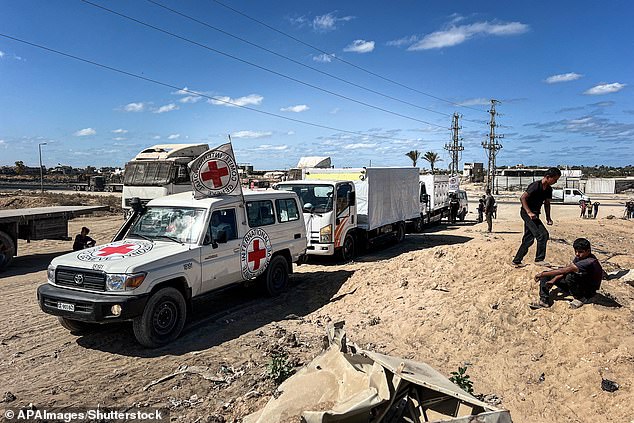Amid the smoldering ruins of Gaza, Red Cross teams are meticulously combing through the wreckage in search of deceased hostages.
The clock is ticking, as Israel had warned Hamas it expected the remaining bodies returned by tonight.
Yet the International Committee of the Red Cross (ICRC) has cautioned that recovering the remains of those killed in the Israel-Hamas conflict could take significant time.
“Finding bodies in the rubble of Gaza is an enormous task,” explained Christian Cardon, an ICRC spokesperson, speaking from Geneva.
“This is a far bigger challenge than releasing living hostages.”
Hamas Frees Last Living Hostages, But Dead Remains Elude Recovery
Earlier this week, Hamas handed over the last surviving Israeli hostages as part of a ceasefire agreement, while Israel reciprocated by releasing busloads of Palestinian detainees. U.S. President Donald Trump marked the occasion as the formal end to the two-year war.
However, the relief was tempered by the grim reality: only four coffins containing the bodies of deceased hostages have been returned so far, leaving more than 20 individuals still unaccounted for.
Meanwhile, Israel is also expected to return an unspecified number of Palestinian remains.
Humanitarian Challenge in Handling the Dead
Cardon stressed the complexity of the ongoing recovery mission. “This could take days or even weeks,” he said.
“There’s a clear risk that it could take much longer. We are urging all parties to make this their top priority.”
To support the effort, the ICRC has deployed an additional 23 staff members, body bags, and refrigerated vehicles to ensure the deceased are handled with dignity amid Gaza’s widespread destruction.
“All parties must ensure the return of human remains is conducted respectfully, upholding humanity and dignity,” the ICRC added.
Families Demand Answers and Accountability
The slow recovery of bodies has sparked outrage among bereaved families in Israel.
The Israeli Hostages and Missing Families Forum called the delay a “blatant breach” of the ceasefire, demanding immediate government action.
“The families of the deceased hostages are enduring especially difficult days filled with deep sorrow,” the group stated.
“The mediators must enforce the agreement and ensure Hamas pays a price for this violation.”
The forum also appealed to U.S. special envoy Steve Witkoff to leave no stone unturned in securing the return of the deceased, emphasizing that Trump’s 20-point peace plan required Hamas to release all hostages—dead or alive—within 72 hours of the deal’s approval.
Joint Efforts to Locate Missing Bodies
In addition to the Red Cross, a multinational task force involving Israel, the U.S., Turkey, Qatar, and Egypt has been established to help locate the missing remains.
This team will begin operations after the identification of the four bodies recently returned by Hamas.
This morning, Israel’s Defense Forces (IDF) confirmed the identities of the four bodies: 26-year-old Israeli Guy Iluz, 22-year-old Nepalese agriculture student Bipin Joshi, and two others reported in Israeli media as Yossi Sharabi and Daniel Perez.
Stories of Courage and Tragedy
Bipin Joshi had only arrived in Israel three weeks prior for agricultural training.
He reportedly saved friends by intercepting a grenade thrown by Hamas before being captured and later killed in captivity.
Iluz, captured during the Nova music festival, initially escaped but was eventually taken after hiding in a tree.
Wounded and denied medical care, he succumbed to his injuries.
Reports indicate that some families who had hoped for reunions were later informed of their loved ones’ deaths, heightening emotional distress.
Peace Plan at Risk Over Unrecovered Remains
Observers warn that the recovery of bodies is critical for the peace plan’s success.
Israel has reportedly begun reconsidering its decision to reopen the Rafah border crossing after Hamas failed to return all deceased hostages, highlighting the delicate balance between political agreements and humanitarian obligations.
The search for human remains in Gaza continues, with the Red Cross and international teams racing against both time and the devastation left behind by the war.
Share on Facebook «||» Share on Twitter «||» Share on Reddit «||» Share on LinkedIn
